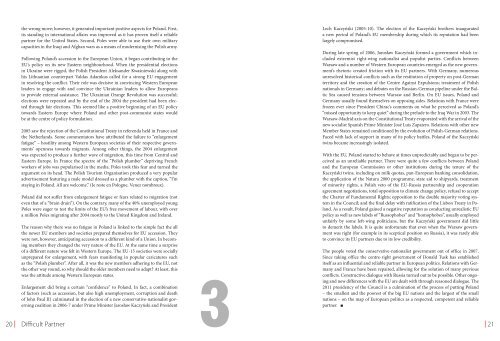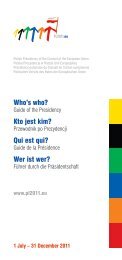„The Brighter Side of Europe” / Piotr Kaczyński
„The Brighter Side of Europe” / Piotr Kaczyński
„The Brighter Side of Europe” / Piotr Kaczyński
You also want an ePaper? Increase the reach of your titles
YUMPU automatically turns print PDFs into web optimized ePapers that Google loves.
the wrong move; however, it generated important positive aspects for Poland. First,<br />
its standing in international affairs was improved as it has proven itself a reliable<br />
partner for the United States. Second, Poles were able to use their own military<br />
capacities in the Iraqi and Afghan wars as a means <strong>of</strong> modernising the Polish army.<br />
Following Poland’s accession to the European Union, it began contributing to the<br />
EU’s policy on its new Eastern neighbourhood. When the presidential elections<br />
in Ukraine were rigged, the Polish President Aleksander Kwaśniewski along with<br />
his Lithuanian counterpart Valdas Adamkus called for a strong EU engagement<br />
in resolving the conflict. Their role was decisive in convincing Western European<br />
leaders to engage with and convince the Ukrainian leaders to allow Europeans<br />
to provide external assistance. The Ukrainian Orange Revolution was successful;<br />
elections were repeated and by the end <strong>of</strong> the 2004 the president had been elected<br />
through fair elections. This seemed like a positive beginning <strong>of</strong> an EU policy<br />
towards Eastern Europe where Poland and other post-communist states would<br />
be at the centre <strong>of</strong> policy formulation.<br />
2005 saw the rejection <strong>of</strong> the Constitutional Treaty in referenda held in France and<br />
the Netherlands. Some commentators have attributed the failure to “enlargement<br />
fatigue” – hostility among Western European societies <strong>of</strong> their respective governments’<br />
openness towards migrants. Among other things, the 2004 enlargement<br />
was expected to produce a further wave <strong>of</strong> migration, this time from Central and<br />
Eastern Europe. In France the spectre <strong>of</strong> the “Polish plumber” depriving French<br />
workers <strong>of</strong> jobs was popularised in the media. Poles took this fear and turned the<br />
argument on its head. The Polish Tourism Organisation produced a very popular<br />
advertisement featuring a male model dressed as a plumber with the caption, “I’m<br />
staying in Poland. All are welcome.” (Je reste en Pologne. Venez nombreux).<br />
Poland did not suffer from enlargement fatigue or fears related to migration (not<br />
even that <strong>of</strong> a “brain drain”). On the contrary, many <strong>of</strong> the 40% unemployed young<br />
Poles were eager to test the limits <strong>of</strong> the EU’s free movement <strong>of</strong> labour, with over<br />
a million Poles migrating after 2004 mostly to the United Kingdom and Ireland.<br />
The reason why there was no fatigue in Poland is linked to the simple fact the all<br />
the newer EU members and societies prepared themselves for EU accession. They<br />
were not, however, anticipating accession to a different kind <strong>of</strong> a Union. In becoming<br />
members they changed the very nature <strong>of</strong> the EU. At the same time a surprise<br />
<strong>of</strong> a different nature was felt in Western Europe. The EU-15 societies were socially<br />
unprepared for enlargement, with fears manifesting in popular caricatures such<br />
as the “Polish plumber”. After all, it was the new members adhering to the EU, not<br />
the other way round, so why should the older members need to adapt? At least, this<br />
was the attitude among Western European states.<br />
Enlargement did bring a certain “confidence” to Poland. In fact, a combination<br />
<strong>of</strong> factors (such as accession, but also high unemployment, corruption and death<br />
<strong>of</strong> John Paul II) culminated in the election <strong>of</strong> a new conservative-nationalist governing<br />
coalition in 2006-7 under Prime Minister Jarosław <strong>Kaczyński</strong> and President<br />
3<br />
Lech <strong>Kaczyński</strong> (2005-10). The election <strong>of</strong> the <strong>Kaczyński</strong> brothers inaugurated<br />
a new period <strong>of</strong> Poland’s EU membership during which its reputation had been<br />
largely compromised.<br />
During late spring <strong>of</strong> 2006, Jarosław <strong>Kaczyński</strong> formed a government which included<br />
extremist right-wing nationalist and populist parties. Conflicts between<br />
Warsaw and a number <strong>of</strong> Western European countries emerged as the new government’s<br />
rhetoric created friction with its EU partners. With Germany, numerous<br />
unresolved historical conflicts such as the restitution <strong>of</strong> property on post-German<br />
territory and the creation <strong>of</strong> the Centre Against Expulsions; treatment <strong>of</strong> Polish<br />
nationals in Germany; and debates on the Russian-German pipeline under the Baltic<br />
Sea caused tensions between Warsaw and Berlin. On EU issues, Poland and<br />
Germany usually found themselves on opposing sides. Relations with France were<br />
frozen ever since President Chirac’s comments on what he perceived as Poland’s<br />
“missed opportunity to keep quiet” during the prelude to the Iraq War in 2003. The<br />
Warsaw-Madrid axis on the Constitutional Treaty evaporated with the arrival <strong>of</strong> the<br />
new socialist Spanish Prime Minister José Luis Zapatero. Relations with other new<br />
Member States remained conditioned by the evolution <strong>of</strong> Polish-German relations.<br />
Faced with lack <strong>of</strong> support in many <strong>of</strong> its policy battles, Poland <strong>of</strong> the <strong>Kaczyński</strong><br />
twins became increasingly isolated.<br />
With the EU, Poland started to behave at times unpredictably and began to be per-<br />
ceived as an unreliable partner. There were quite a few conflicts between Poland<br />
and the European Commission or other institutions during the tenure <strong>of</strong> the<br />
<strong>Kaczyński</strong> twins, including on milk quotas, pan-European banking consolidation,<br />
the application <strong>of</strong> the Natura 2000 programme, state aid to shipyards, treatment<br />
<strong>of</strong> minority rights, a Polish veto <strong>of</strong> the EU-Russia partnership and cooperation<br />
agreement negotiations, total opposition to climate change policy, refusal to accept<br />
the Charter <strong>of</strong> Fundamental Rights; opposition to the double majority voting system<br />
in the Council; and the final delay with ratification <strong>of</strong> the Lisbon Treaty in Poland.<br />
As a result, Poland gained a negative reputation as conducting unrealistic EU<br />
policy as well as new labels <strong>of</strong> “Russophobes” and “homophobes”, usually employed<br />
unfairly by some left-wing politicians, but the <strong>Kaczyński</strong> government did little<br />
to demerit the labels. It is quite unfortunate that even when the Warsaw government<br />
was right (for example in its sceptical position on Russia), it was rarely able<br />
to convince its EU partners due to its low credibility.<br />
The people voted the conservative-nationalist government out <strong>of</strong> <strong>of</strong>fice in 2007.<br />
Since taking <strong>of</strong>fice the centre-right government <strong>of</strong> Donald Tusk has established<br />
itself as an influential and reliable partner in European politics. Relations with Germany<br />
and France have been repaired, allowing for the solution <strong>of</strong> many previous<br />
conflicts. Constructive dialogue with Russia turned out to be possible. Other ongoing<br />
and new differences with the EU are dealt with through reasoned dialogue. The<br />
2011 presidency <strong>of</strong> the Council is a culmination <strong>of</strong> the process <strong>of</strong> putting Poland<br />
– the smallest and the poorest <strong>of</strong> the big EU nations and the largest <strong>of</strong> the small<br />
nations – on the map <strong>of</strong> European politics as a respected, competent and reliable<br />
partner.<br />
20 | Difficult Partner<br />
| 21



